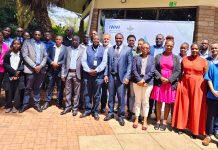By Duncan Mboyah
The Food and Agricultural Organization of the United Nations (FAO) has called for a shift from reactive to anticipatory actions in management of drought, floods, conflict, and displacement in the Horn of Africa (HoA) region.
Andrea Berloffa, senior emergency and rehabilitation officer at FAO said that the challenges have made the region one of the most food-insecure in the world, hosting 23 percent of the global population experiencing high levels of food insecurity.
“The trend that continued to get worse since 2019 is calling for a real shift with a focus on coordination and harmonization,” Berloffa said during the launch of a regional harmonized anticipatory action approach in Nairobi, Kenya’s capital.
He observed that the region has not benefited from early warnings that did not end up translating into timely anticipatory action hence leading to devastating consequences.
Berloffa said that the severe drought in the HoA from 2020 to 2023 was predicted well in advance hence calling for advocacy to help avert losses associated with drought.
The UN official said that the challenge now is to scale up these efforts, not just by doing more of the same, but by optimizing anticipatory action systems to address the complex, interconnected hazards communities face.
Berloffa noted that FAO in collaboration with governments, humanitarian agencies, and the scientific community has long advocated for anticipatory action to protect livelihoods and food security in the region.
The collaboration by FAO, he added, has since led to significant progress in Somalia and Ethiopia despite insufficient funding that led to a catastrophic humanitarian emergency.
“We need to take a multi-hazard approach to ensure that our actions are truly impactful to populations on the ground,” Berloffa added.
He noted that the partnerships with Intergovernmental Authority on Development (IGAD) and IGAD Climate and Prediction and Application Centre (ICPAC), in particular, have been pivotal in driving FAO’s regional resilience and disaster risk reduction efforts.
Berloffa observed that besides supporting the development of the IGAD regional roadmap for anticipatory action and the establishment of the regional anticipatory action technical working group, the UN agency has also co-led the regional Food Security and Nutrition Working Group (FSNWG), which provides regular multi-hazard early warning information to decision-makers across the region.
He added that the newly launched anticipatory action plan is more than just another anticipatory action initiative as it marks a critical evolution that requires aligning of efforts towards building resilient communities and food systems that are better equipped for future challenges.
The harmonized anticipatory action approach is a shift from reactive crisis response to smarter, dignified, and cost-effective solutions instead of waiting for disaster to strike and cause damage and losses, the partners now act before crisis escalates, saving lives, preserving livelihoods, and protecting hard-won development gains.
The united approach is meant to strengthen regional and national capacities for proactive disaster preparedness.






